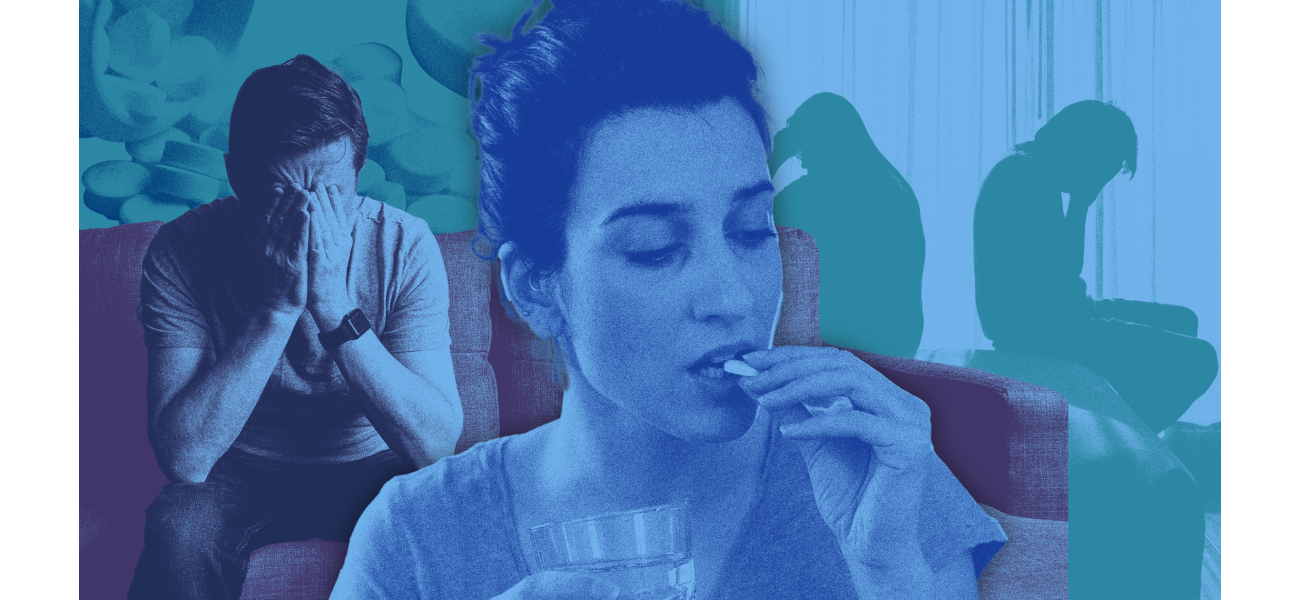Antidepressants caused numbness in my genitals.
My emotions and sexuality have been taken away.
October 12th 2024.

For some patients, taking antidepressants can lead to long-term sexual dysfunction. This was the case for 47-year-old Carmen, who described feeling "emotionally and sexually castrated" while taking the antidepressant Escitalopram for her anxiety. At first, the medication seemed to work wonders for her, alleviating all traces of her anxiety and boosting her self-confidence. However, she soon experienced a devastating side-effect: post-SSRI sexual dysfunction (PSSD). This disorder can cause a range of issues, from erectile dysfunction and low libido to a lack of feeling in the genitals and difficulty reaching orgasm. Some patients even report feeling emotionally numb and disconnected from their loved ones, and these consequences can last for years, or even decades.
Carmen's experience is not unique. Many others have also reported similar side-effects after taking SSRIs. One of them is Demi, a 27-year-old woman who shared her story in Metro's How I Do It column. She described how the antidepressant Citalopram had affected her sex drive, leading to a complete loss of arousal. After her story was published, many others with the same struggles came forward, asking for their voices to be heard.
PSSD is a relatively new condition, only recognized by the European Medicines Agency in 2019. However, the first reports of profound sexual side effects linked to SSRIs emerged in the 1990s, not long after the first selective serotonin reuptake inhibitor was approved by the FDA in 1987. Since then, a patient support organization called PSSD Network has been launched, along with a Reddit community with over 10,000 members. Carmen is one of them.
It's important to note that while SSRIs can be life-saving for many people, some are left with life-altering side-effects. More than 80 million antidepressants were prescribed by the NHS in the first 11 months of 2023 alone. However, funding for research on PSSD and how it can be treated remains almost nonexistent. Despite cases like Carmen's, pharmaceutical giants have shown no indication of funding PSSD research in the future.
Carmen's experience is a stark reminder that the potential sexual side effects of SSRIs are often downplayed or not disclosed by doctors. Despite the fact that some SSRIs, like Prozac and sertraline, were initially proposed as a treatment for reducing sexual urges in sex offenders, patients are not always informed about this possible side-effect. In fact, when Demi raised concerns about PSSD and other potential side-effects with her doctor, she was dismissed.
So, what exactly is PSSD, and how is it treated? According to Dr. Lawrence Cunningham, patients affected by PSSD often report a persistent decrease in sexual function, including reduced libido and erectile dysfunction, even after they have stopped taking SSRIs. The exact cause of PSSD is still not fully understood, with some experts linking it to changes in the brain's serotonin system, while others point to alterations in neurotransmitters or the nervous system. While there is no definitive cure, psychological support, regular exercise, and stress management techniques can be helpful in easing the symptoms.
One of the leading SSRI manufacturers, Eli Lilly, has stated that nothing is more important to them than the safety of their medicines. They have been submitting safety data for fluoxetine (Prozac) to regulatory authorities for decades and maintain that the benefits of the drug outweigh the potential risks. However, patients like Carmen and Demi believe that the risks were not adequately disclosed to them, leading to devastating consequences.
The issue of long-term sexual dysfunction caused by SSRIs has also been raised in the European Parliament, with Finnish MEP Sirpa Pietikainen calling for more awareness to be raised about this potential side-effect. For patients like Carmen and Demi, who have experienced a complete loss of their sex drive and sexual sensations, the impact on their mental health has been severe. Carmen has even admitted to feeling depressed and suicidal at times, saying that she has no control over her own body and desires.
In a perfect world, patients would be fully informed about the potential side-effects of any medication they are prescribed, and more funding would be allocated for research on conditions like PSSD. Until then, it's crucial for patients to advocate for themselves and for the medical community to take these concerns seriously. As Carmen puts it, "I don't accept living like this. I want the power to make my own choices about my body and my life."
Long-term sexual dysfunction is a well-known side-effect that some patients may experience when taking antidepressants. This condition, known as PSSD (Post-SSRI Sexual Dysfunction), can cause a range of symptoms including erectile dysfunction, a decrease in libido, difficulty reaching orgasm, and a lack of feeling in the genitals. Carmen, a 47-year-old woman, experienced these devastating side-effects after taking the antidepressant Escitalopram for a year. She shares her story of how the drug transformed her life but also caused a profound loss of her sexuality.
Carmen's journey with Escitalopram began when she was prescribed the medication for anxiety at the age of 36. Initially, the drug helped her overcome her anxiety and gave her newfound confidence. However, as time went on, she developed PSSD, which affected her ability to feel sexual desire and pleasure. Some people with PSSD also report a numbing of emotions and inability to feel love for their children, and these effects can last for years or even decades.
Carmen describes the moment she realized something was wrong after weaning herself off the drug. Within 24 hours, she felt a strong disconnection from her sexuality and was unable to climax while attempting to masturbate. "It dehumanized me," she shares. PSSD can occur in both men and women and was only recognized as a condition in 2019, despite the first reports of sexual side-effects linked to SSRIs emerging in the 1990s.
Since then, a patient support organization called PSSD Network has been launched, along with a Reddit community that has over 10,000 members. Carmen is one of them, and she shares her story to raise awareness about PSSD and the lack of research surrounding it. While SSRIs can be lifesaving for many people, the potential for life-altering side-effects cannot be ignored.
Carmen's experiences reflect those of many others who have been affected by PSSD. Due to the lack of knowledge and research, patients were not warned about the potential for long-term sexual dysfunction when prescribed SSRIs. Even now, pharmaceutical companies like Eli Lilly, who manufacture Prozac, continue to claim that their drugs have a positive benefit-risk profile, despite the evidence of PSSD. This has led to questions about the safety and informed consent of patients taking these medications.
PSSD is a complex condition, and there is currently no definitive cure. However, psychological support, regular exercise, and stress management techniques can help manage the symptoms. But the lack of funding for research on PSSD means there is still much to be learned about the condition and how to treat it.
Stories like Carmen's highlight the need for better awareness and understanding of PSSD and the potential consequences of taking SSRIs. The media has a crucial role in raising awareness and giving a voice to those who have been affected. As one woman shared her story, many others came forward with similar experiences, demonstrating the need for more attention to be given to this issue.
Carmen ends her story by saying, "I don't accept living like this." Her words are a call to action for more research and awareness about PSSD and the potential side-effects of antidepressants. As we strive to improve mental health treatment, it's essential to consider the full impact of these medications and ensure patients are fully informed about the potential risks.
Carmen's experience is not unique. Many others have also reported similar side-effects after taking SSRIs. One of them is Demi, a 27-year-old woman who shared her story in Metro's How I Do It column. She described how the antidepressant Citalopram had affected her sex drive, leading to a complete loss of arousal. After her story was published, many others with the same struggles came forward, asking for their voices to be heard.
PSSD is a relatively new condition, only recognized by the European Medicines Agency in 2019. However, the first reports of profound sexual side effects linked to SSRIs emerged in the 1990s, not long after the first selective serotonin reuptake inhibitor was approved by the FDA in 1987. Since then, a patient support organization called PSSD Network has been launched, along with a Reddit community with over 10,000 members. Carmen is one of them.
It's important to note that while SSRIs can be life-saving for many people, some are left with life-altering side-effects. More than 80 million antidepressants were prescribed by the NHS in the first 11 months of 2023 alone. However, funding for research on PSSD and how it can be treated remains almost nonexistent. Despite cases like Carmen's, pharmaceutical giants have shown no indication of funding PSSD research in the future.
Carmen's experience is a stark reminder that the potential sexual side effects of SSRIs are often downplayed or not disclosed by doctors. Despite the fact that some SSRIs, like Prozac and sertraline, were initially proposed as a treatment for reducing sexual urges in sex offenders, patients are not always informed about this possible side-effect. In fact, when Demi raised concerns about PSSD and other potential side-effects with her doctor, she was dismissed.
So, what exactly is PSSD, and how is it treated? According to Dr. Lawrence Cunningham, patients affected by PSSD often report a persistent decrease in sexual function, including reduced libido and erectile dysfunction, even after they have stopped taking SSRIs. The exact cause of PSSD is still not fully understood, with some experts linking it to changes in the brain's serotonin system, while others point to alterations in neurotransmitters or the nervous system. While there is no definitive cure, psychological support, regular exercise, and stress management techniques can be helpful in easing the symptoms.
One of the leading SSRI manufacturers, Eli Lilly, has stated that nothing is more important to them than the safety of their medicines. They have been submitting safety data for fluoxetine (Prozac) to regulatory authorities for decades and maintain that the benefits of the drug outweigh the potential risks. However, patients like Carmen and Demi believe that the risks were not adequately disclosed to them, leading to devastating consequences.
The issue of long-term sexual dysfunction caused by SSRIs has also been raised in the European Parliament, with Finnish MEP Sirpa Pietikainen calling for more awareness to be raised about this potential side-effect. For patients like Carmen and Demi, who have experienced a complete loss of their sex drive and sexual sensations, the impact on their mental health has been severe. Carmen has even admitted to feeling depressed and suicidal at times, saying that she has no control over her own body and desires.
In a perfect world, patients would be fully informed about the potential side-effects of any medication they are prescribed, and more funding would be allocated for research on conditions like PSSD. Until then, it's crucial for patients to advocate for themselves and for the medical community to take these concerns seriously. As Carmen puts it, "I don't accept living like this. I want the power to make my own choices about my body and my life."
Long-term sexual dysfunction is a well-known side-effect that some patients may experience when taking antidepressants. This condition, known as PSSD (Post-SSRI Sexual Dysfunction), can cause a range of symptoms including erectile dysfunction, a decrease in libido, difficulty reaching orgasm, and a lack of feeling in the genitals. Carmen, a 47-year-old woman, experienced these devastating side-effects after taking the antidepressant Escitalopram for a year. She shares her story of how the drug transformed her life but also caused a profound loss of her sexuality.
Carmen's journey with Escitalopram began when she was prescribed the medication for anxiety at the age of 36. Initially, the drug helped her overcome her anxiety and gave her newfound confidence. However, as time went on, she developed PSSD, which affected her ability to feel sexual desire and pleasure. Some people with PSSD also report a numbing of emotions and inability to feel love for their children, and these effects can last for years or even decades.
Carmen describes the moment she realized something was wrong after weaning herself off the drug. Within 24 hours, she felt a strong disconnection from her sexuality and was unable to climax while attempting to masturbate. "It dehumanized me," she shares. PSSD can occur in both men and women and was only recognized as a condition in 2019, despite the first reports of sexual side-effects linked to SSRIs emerging in the 1990s.
Since then, a patient support organization called PSSD Network has been launched, along with a Reddit community that has over 10,000 members. Carmen is one of them, and she shares her story to raise awareness about PSSD and the lack of research surrounding it. While SSRIs can be lifesaving for many people, the potential for life-altering side-effects cannot be ignored.
Carmen's experiences reflect those of many others who have been affected by PSSD. Due to the lack of knowledge and research, patients were not warned about the potential for long-term sexual dysfunction when prescribed SSRIs. Even now, pharmaceutical companies like Eli Lilly, who manufacture Prozac, continue to claim that their drugs have a positive benefit-risk profile, despite the evidence of PSSD. This has led to questions about the safety and informed consent of patients taking these medications.
PSSD is a complex condition, and there is currently no definitive cure. However, psychological support, regular exercise, and stress management techniques can help manage the symptoms. But the lack of funding for research on PSSD means there is still much to be learned about the condition and how to treat it.
Stories like Carmen's highlight the need for better awareness and understanding of PSSD and the potential consequences of taking SSRIs. The media has a crucial role in raising awareness and giving a voice to those who have been affected. As one woman shared her story, many others came forward with similar experiences, demonstrating the need for more attention to be given to this issue.
Carmen ends her story by saying, "I don't accept living like this." Her words are a call to action for more research and awareness about PSSD and the potential side-effects of antidepressants. As we strive to improve mental health treatment, it's essential to consider the full impact of these medications and ensure patients are fully informed about the potential risks.
[This article has been trending online recently and has been generated with AI. Your feed is customized.]
[Generative AI is experimental.]
0
0
Submit Comment





